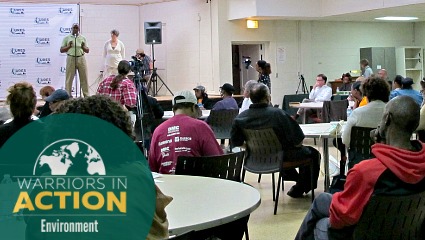
Wayne State University's Center for Urban Responses to Environmental Stressors (CURES) recently hosted a special event focused on how to have healthier homes. With a nearly packed house at Matrix Human Services of Detroit, local residents learned important information to help them improve their health and homes.
Guy Williams, CEO and founder of Detroiters Working for Environmental Justice (DWEJ), kicked off the event by informing attendees about the health risks involved with using many common household chemicals, plastics and more. DWEJ works in collaboration with numerous community partners, including Wayne State University, to create clean, healthy and thriving communities in Michigan by tackling environmental problems that touch homes. Through their efforts, they help shape policies that strengthen the voice of communities, educate residents in an effort to have safe and healthy neighborhoods, and ensure that as neighborhoods are rebuilt, there is a focus on repairing and protecting the environment.
Zero Waste Detroit joined the event to discuss the assistance they can give to help residents begin curbside recycling in Detroit. Through their efforts, they are helping to eliminate waste that goes into incinerators and ultimately reduce toxins that enter the environment. Staff members from Zero Waste Detroit reach out to the community by visiting community organizations, block clubs, church groups and more. Through their efforts, they hope to expand curbside recycling programs citywide and greatly reduce the amount of waste that ends up in landfills and incinerators.
Melissa Cooper Sargent of the Ecology Center gave tips on how to keep indoor air healthier, home cleaning recipes, tips on reading cleaning labels, and more. Her recommendations include:
- Circulate the air in homes by opening windows and using air conditioning units less. The EPA finds that indoor air is more polluted than the air outside.
- Remove shoes at the door when coming indoors to avoid tracking outside contaminants throughout the house.
- Eliminate the use of pesticides. Use traps and non-toxic sprays instead.
- Use green cleaners: do not use air fresheners, avoid antibacterial soaps, and avoid products that are labeled dangerous, poisonous and flammable. Essential oils are great to use as scents in the home. White vinegar is a food-grade antimicrobial; mild soap and warm water effectively remove germs after 30 seconds of washing hands; and baking soda, vinegar, and mild soap can be used to make cleaning products. (For recipes, visit: ecocenter.org/home-cleaning-recipes)
- Avoid BPA in plastics. Do not heat food in plastics or Styrofoam, avoid canned foods, and use glass or stainless steel reusable drinking bottles. Do not drink from plastic bottles left in hot cars.
To view the top 10 tips to avoid toxics at home, visit ecocenter.org/sites/default/files/toxics/Top%2010%20Tips%20to%20Avoid%20Toxics%20at%20Home-EC15.pdf
Residents left with an arsenal of great tips on how to make their homes and neighborhoods healthier and cleaner.
The event was led by Peter Lichtenberg, director of the Institute of Gerontology and Merrill Palmer Skillman Institute, and CARES Community Outreach and Engagement Team co-director; Melissa Sargent, CARES Community Outreach and Engagement Team advisory board co-chair and environmental health educator at the Ecology Center; Guy Williams, CEO and founder of Detroiters Working for Environmental Justice; and Brian Smith, CURES outreach coordinator.
CURES is one of approximately 20 select P30 Core Centers funded by the National Institute of Environmental Health Sciences of the National Institutes of Health (ES020957). CURES places special emphasis on understanding how environmental exposures during life windows of heightened susceptibility can adversely affect health, particularly in vulnerable persons such as children and adults of low socioeconomic status, older adults, first responders and refugees.
At the heart of CURES is a grass-roots community engagement program committed to improving healthy living and working environments in the city of Detroit. CURES applies team-based approaches that integrate multiple disciplines to address pressing environmental health problems. CURES is directed by Melissa Runge-Morris, M.D., director of Wayne State University's Institute of Environmental Health Sciences and professor of oncology.
Environmental impact
From water and urban farming to sustainability, green technologies and much more, Wayne State's location in the heart of Detroit provides students with endless opportunities to make a substantial difference in the city and beyond through interdisciplinary pathways in the arts and sciences, engineering, law, medicine, pharmacy, and business. Read more.
